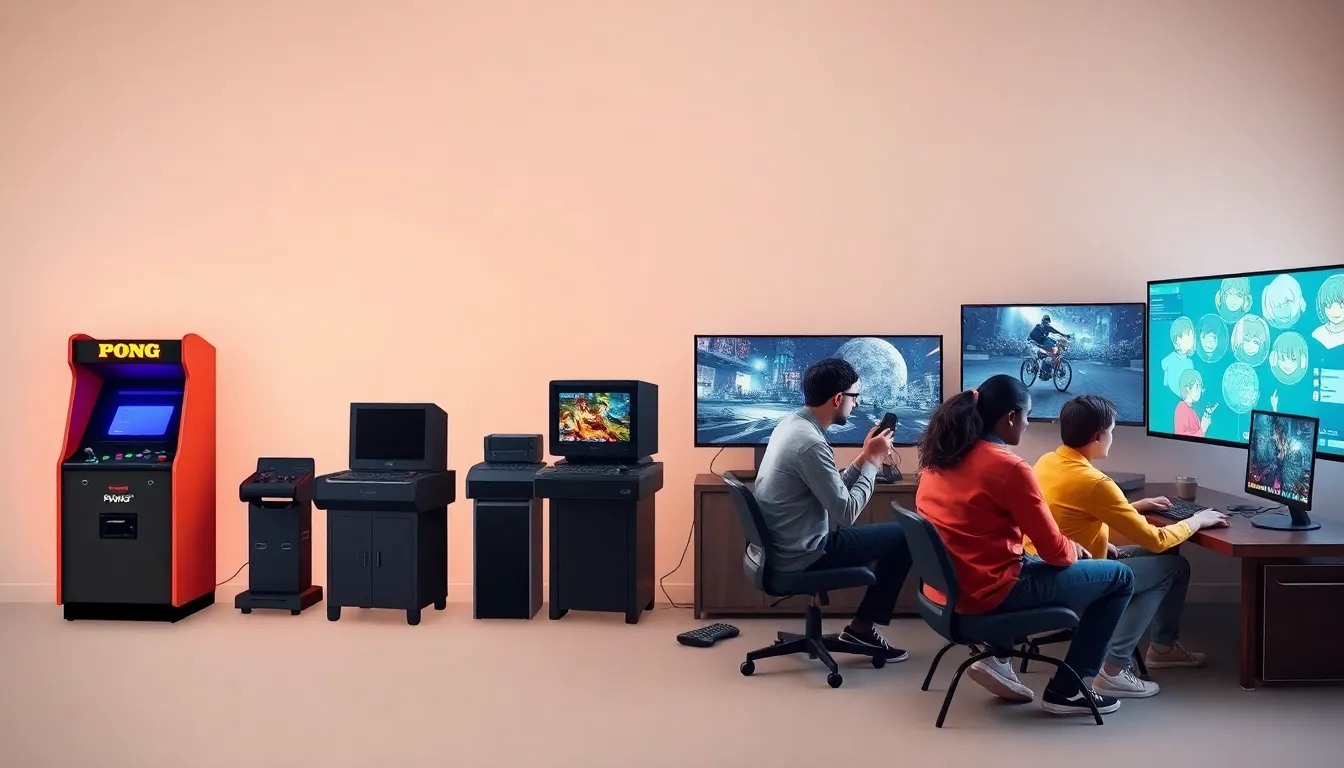Table of Contents
ToggleGaming has come a long way from the pixelated screens of yesteryears to the immersive universes we explore today. Have you ever wondered how we got here? Jump into the captivating saga of gaming that spans decades, cultures, and technological evolutions. It’s like a thrilling quest in a RPG, full of twists, turns, and epic boss battles (minus the actual dragons, of course). Grab your controller, settle in, and let’s embark on a gaming journey that’s as enlightening as it is entertaining.
The Evolution Of Gaming: A Journey Through Time

The world of gaming has transformed immensely since its inception. From arcade cabinets buzzing with the sounds of 8-bit melodies to today’s sumptuous graphics and dynamic storytelling, the evolution of gaming is a tale worth exploring.
Key Milestones In Gaming History
In the 1970s, video games began to emerge. Titles like “Pong” captured the imagination of players, laying the groundwork for the industry. The 1980s introduced home consoles, with Nintendo and Sega battling for supremacy. With each decade, we’ve seen revolutionary innovations, 3D graphics, online multiplayer, and mobile gaming just to name a few.
One can’t overlook the staggering impact of the internet during the late ’90s. Suddenly, gaming wasn’t just a solitary experience. Players connected globally, forging friendships and rivalries that were previously unimaginable.
The Rise Of Online Gaming Communities
Online gaming communities boomed in the 2000s, transforming how people interacted within game worlds. Platforms like Xbox Live and PlayStation Network opened doors to virtual friendships. Gamers began forming alliances to conquer dungeons and share strategies in games like “World of Warcraft”. These interactions enriched the gaming experience, turning it into a social activity instead of a lone try.
Current Trends In The Gaming Industry
As technology advances, so do the trends shaping the gaming landscape today.
Popular Genres And Their Impact
The gaming universe is expansive, with genres flourishing. Action-packed shooters like “Call of Duty” dominate, while narrative-driven games like “The Last of Us” captivate players emotionally. Also, genres like battle royale have exploded onto the scene, showcasing how adaptability is vital. These trends reflect not only changing player preferences but also the industry’s dynamic nature. Genres constantly evolve, pushing developers to innovate.
The Role Of Technology In Modern Gaming
Technology is intertwined with gaming, revolutionizing our interaction with games. Virtual reality (VR) creates captivating experiences that immerse players into worlds beyond imagination. Meanwhile, cloud gaming is redefining accessibility, allowing gamers to dive right in without heavy hardware. These advancements demonstrate how the gaming industry is merging creativity with technology to craft experiences that resonate.
Psychological Effects Of Gaming
Gaming isn’t just a form of entertainment. It has profound psychological impacts, both positive and negative.
Benefits And Drawbacks Of Gaming
On the one hand, studies show that gaming can enhance cognitive skills. Puzzle games foster problem-solving abilities while strategic games develop planning skills. But, it’s not all rainbows and power-ups. Excessive gaming can lead to addiction, negatively affecting social interactions and mental health. Like any activity, moderation is essential.
Gaming As A Social Experience
Even though its drawbacks, gaming serves as a unique social experience. Engaging in cooperative play fosters teamwork and leadership skills. Gamers communicate, strategize, and bond over victories and defeats alike. This communal aspect can lead to lasting friendships, proving that gaming isn’t just about the game: it’s about the connections we forge.
Whether it’s through a headset with a group of friends or locally in a living room, gaming bridges gaps between individuals, introducing a sense of belonging.







